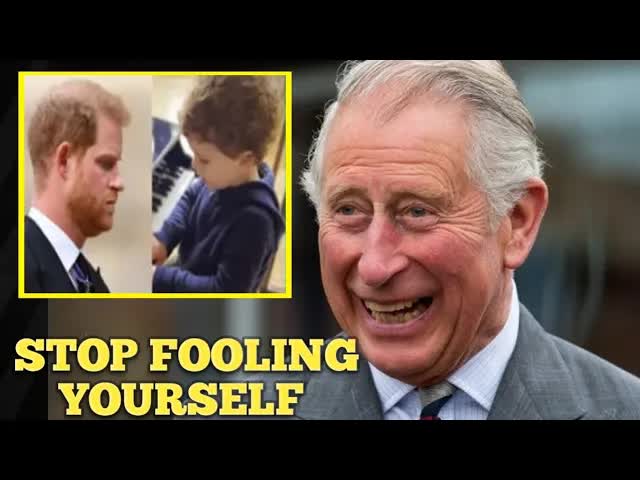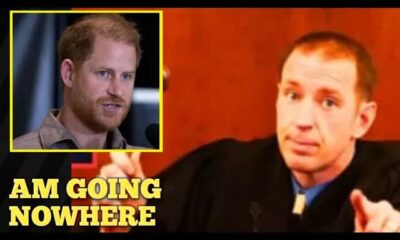The News
King Charles III’s Stern Warning to Prince Harry: A Family in Turmoil
The British monarchy is no stranger to public scrutiny, but the evolving dynamics within the royal family have taken center stage, particularly the relationship between King Charles III and his younger son, Prince Harry.
Recently, a striking warning from King Charles to Harry regarding his children, Archie and Lilibet, has sparked widespread discussion on social media and in news outlets, igniting curiosity about the implications of such a statement.
Reports suggest that King Charles has issued a serious caution to Prince Harry, advising him against bringing his children back to the UK unless he can guarantee their safety and well-being.
This strong stance has raised eyebrows and led to speculation about the motivations behind it.
King Charles, known for his adherence to tradition, appears to be wrestling with the realities of modern family life and the challenges that arise when royal responsibilities intersect with personal choices.
The relationship between King Charles and Prince Harry has been anything but smooth.
Following Harry's decision to step back from royal duties and relocate to California with his wife, Meghan Markle, the royal family has faced numerous hurdles in maintaining both their public image and internal harmony.
This departure fueled a media frenzy, resulting in a mix of support for Harry's quest for independence and criticism for distancing himself from the royal legacy.
As King Charles embraces his role as monarch, he is acutely aware of the weighty responsibilities that come with the crown.
His reign is characterized by a desire to modernize the monarchy and connect with a wider audience.
However, this ambition often clashes with the traditional expectations held by some royal family members.
The recent warning to Prince Harry can be interpreted as an effort to strike a balance between these competing interests, ensuring the monarchy's future while also safeguarding his grandchildren.
The notion that Prince Harry must prove himself before introducing Archie and Lilibet to the UK speaks volumes about the current family dynamics.
It underscores a profound concern for the children's safety and upbringing, reflecting a protective instinct inherent in any parent.
Yet, the very phrasing of this warning hints at deeper issues—specifically, a lack of trust.
This distrust likely stems from Harry's candid revelations about royal life, including his interviews and memoir that have painted a less-than-flattering picture of the institution.
Public sentiment on this matter is divided.
Many sympathize with Prince Harry, viewing him as a father striving to ensure his children's well-being in an environment fraught with challenges.
Conversely, others see King Charles's warning as a necessary measure to protect the monarchy's reputation and stability.
These contrasting opinions highlight a broader discourse surrounding modern parenting, the responsibilities of public figures, and societal expectations.
Caught in the midst of this familial strife are the innocent lives of Archie and Lilibet.
As the king's grandchildren, they already attract immense public interest.
King Charles's warning could be seen as an act of love, aimed at protecting their interests, or as a paternalistic approach undermining Harry's autonomy as a father.
The implications of this warning resonate beyond the immediate family, touching upon themes of loyalty, duty, and the evolving nature of royal life.
As this story continues to unfold, it's crucial to consider the historical context of the royal family.
The British monarchy has long symbolized tradition, yet it must adapt to changing societal norms.
King Charles faces the challenge of upholding these traditions while engaging with a modern world that demands transparency and relatability.
His warning to Prince Harry serves as a reminder of the delicate balance he must maintain, navigating familial bonds alongside public expectations.
Looking forward, uncertainty looms for Prince Harry, Archie, Lilibet, and the royal family.
Will Harry heed his father's warning?
Could reconciliation be on the horizon, or will estrangement deepen?
These questions linger as the world watches closely, aware that the relationship between King Charles and Prince Harry will continue to evolve, influenced by their choices and the narratives surrounding them.
This intricate family dynamic invites contemplation on broader themes.
The interplay between duty and personal choice, the weight of tradition in a rapidly changing world, and the enduring power of familial love all converge in this poignant narrative.
King Charles's warning encapsulates the challenges faced by modern monarchs as they navigate the expectations of their roles while striving to connect with loved ones on a personal level.
Moreover, the potential legal ramifications of King Charles's warning regarding the visitation of his grandchildren to the UK are complex and could significantly impact both family dynamics and the royal institution.
The warning raises questions about custody and parental rights.
While the king does not hold legal authority over Prince Harry's decisions, the public nature of the warning invites speculation about the monarchy's influence on legal matters concerning the children.
If Prince Harry were to disregard his father's warning and bring Archie and Lilibet to the UK, he might face resistance not only from the royal family but potentially from legal entities as well.
Concerns about the children's safety or upbringing could spark legal disputes regarding what constitutes a suitable environment for them.
Such scenarios could lead to family law proceedings, where courts may need to assess the appropriateness of exposing the children to a high-profile and contentious atmosphere.
Additionally, the impact of public opinion and media scrutiny cannot be overlooked.
The British royal family operates under constant media attention, and any legal disputes involving Prince Harry would likely attract significant coverage, complicating matters further.
If legal action arises concerning the children's welfare or visitation rights, the ensuing public discourse could influence how the legal system addresses these issues, making courts cautious about rulings that might be perceived as taking sides.
As the royal family navigates these turbulent waters, privacy laws come into play, especially considering that Archie and Lilibet are minors.
The children's best interests must remain paramount in any legal context, and any legal actions taken will undoubtedly be scrutinized through this lens.
If King Charles's warning evolves into a formal legal challenge regarding the children's presence in the UK, considerations of privacy rights will be crucial, particularly in an age where digital media often exposes young royals to the public eye.
Ultimately, King Charles's warning could spark discussions about the responsibilities and duties of a modern monarch.
If perceived as an overreach of authority or an attempt to control personal family matters, it may ignite debates about the monarchy's role in familial affairs.
This could lead to calls for reforming royal protocols and practices, potentially resulting in legal ramifications if such reforms necessitate changes in the existing framework.


































































